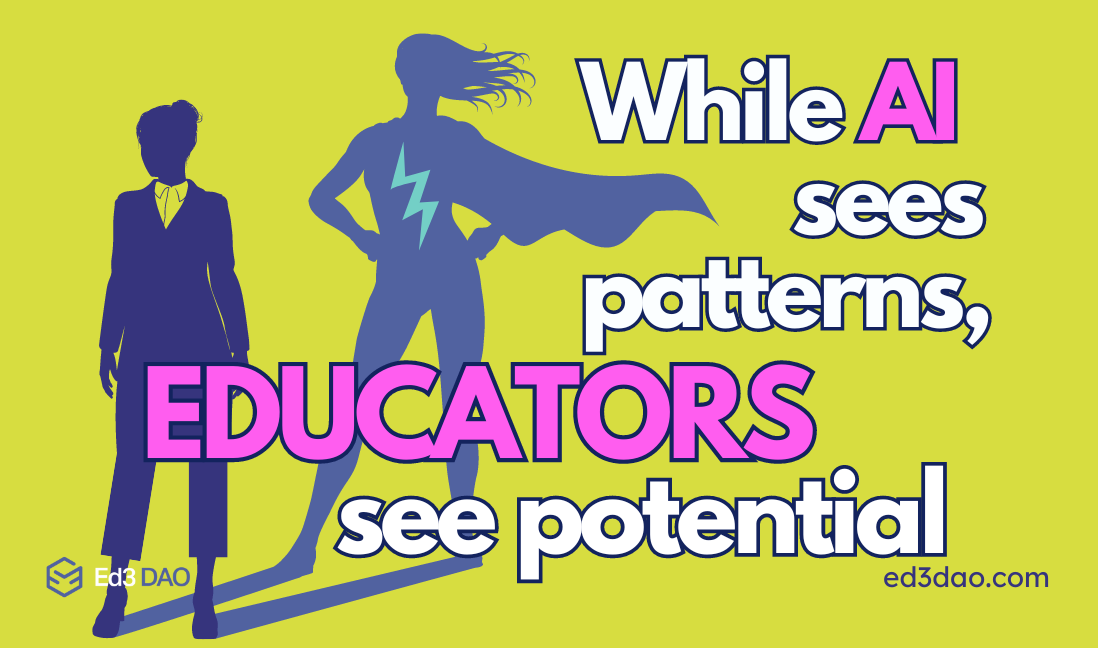The Chilling Truth About Teachers: Ed3 World Newsletter Issue #30
This is a special issue in honor of Teacher Appreciation Week.
This (almost) monthly newsletter serves as your bridge from the real world to the advancements of AI & web3, specifically contextualized for education.
Dear Educators & Friends,
The last few months have been an exciting whirlwind with our annual Ed3 Summit, new opportunities for our growing non-profit, and other conferences and events. I'm delighted to be back, ending my newsletter hiatus with a special issue focused on educators. I hope this edition offers fresh insights for our non-teacher readers and strikes a chord with those who are in the classroom.
The Chilling Truth About Teachers
The Pew Research Center published a report in April detailing the current state of teaching in America. Given the widely reported teacher shortage, the findings of the report are not surprising.
⏳ 80% of teachers say they don't have enough time to get their work done.
🏫 70% report that their school is understaffed.
🙅🏽 More than half would NOT advise a young person to become a teacher.
Pretty bleak for a profession that impacts every human on the planet.
What are we trying to solve for?
Considering our work at Ed3 DAO around AI professional development and communities of practice, at first, I found myself brainstorming possible solutions...
How might we help educators regain their time with AI through work redistribution?
How might we help administrators find better solutions for scheduling?
How might AI tools help students learn better self-management skills?
These seem to be the obvious questions to ask... but are they the right questions?
I'm a big fan of First Principles Thinking to identify the right problem to solve, reflected in my letter to NYCPS back in May 2023. If we take one step back from the glare of shiny AI tools, a new question comes to mind...
Why are we providing AI solutions to maintain the status quo of a system that is currently producing subpar results by it's own measures?
We're seeing gaps in learning across the board and things don't seem to be improving. I do recognize the immediate need to quell fires and prevent our most talented educators from burning out. The Pew report reveals that 77% of teachers frequently find their job stressful. A 2022 Gallup poll indicates that K-12 educators report higher rates of burnout than professionals in any other sector.
But will using AI tools to perpetuate a system that doesn't work, really save this profession? Will giving educators a way to produce lesson plans faster really improve results?
Going back to the fundamentals, it seems that we're not actually trying to solve for the improvement of learning or the improvement of the profession, or even the long-term sustainability of the profession.
We're solving for short-term, day-to-day survival.
Today, many Edtech solutions, professional learning opportunities, and resources (anything from AI lesson plan generators to student behavior management tools) are simply focused on survival.
The Trappings of the Present
What do we give up when we're in day-to-day survival mode? What kinds of decisions do we make? How does it affect our brain chemistry? The challenges teachers face are more profound than they might initially appear.
Prefrontal Cortex: This area, responsible for higher-order thinking, decision-making, and impulse control, can become less active in survival mode. (BrainFacts)
Hippocampus: Important for memory formation, the hippocampus can be inhibited by high levels of cortisol, potentially leading to impaired memory or learning difficulties over time if stress is chronic. (Boston Clinical Trials)
Amygdala: Critical for processing fear and emotional responses, our amygdala may become overstimulated. This hyperactivation can make the brain perceive threats more frequently. (Boston Clinical Trials)
What are the implications on students?
Logically, stressed and unhappy teachers make for stressed and unhappy students. Furthermore, when the focus remains solely on survival, it hinders our ability to look beyond the immediate needs. If educators are mired in a system that only prepares students for the challenges of today, how can we expect them to thrive in an uncertain future? What are the broader consequences for society?
Consider the transformative impact of the internet over the past four decades. It brought about global connectivity and collaboration on an unprecedented scale, leading to the rise of social media, which has fundamentally reshaped human interactions and societal structures. The internet also democratized access to knowledge, enabled content creation and sharing on a massive scale, and revolutionized global economies through e-commerce, creating careers that were previously unimaginable.
AI is poised to shift paradigms in ways we cannot yet fully predict, impacting us through similar vectors.
AI already enhances language accessibility, personalizes recommendations, and facilitates curated connections. It can aggregate and analyze information a hundred times more effectively and rapidly than humans, exponentially expanding our access to data. AI contributes to the spread of both accurate and misleading information, making the latter more convincing and potentially magnifying both the positive and negative impacts of social media. Finally, AI has already begun to forge new job functions, reshaping the labor market in profound ways.
We must equip educators and students with the ability to adapt to an ever-changing world, particularly given the unpredictability of future developments. However, our current school systems and educational methodologies are stuck in the present, limiting our preparedness for what lies ahead.
The Reluctant Revolution
Here are the critical issues we've defined so far.
Our current system is failing, and it's primary stakeholders- teachers & students- are bearing the brunt. Student achievement scores are dwindling and teacher satisfaction is at an all time low.
Most external technologies, curricula, and professional development interventions merely prop up the status quo.
Our current educational model is ill-equipped to prepare learners for the uncertainties of tomorrow.
Transforming an entrenched system like education seems nearly insurmountable. While small-scale experiments show glimpses of what could be possible, significant successes often require substantial funding.
Historically, significant changes have been propelled by collective action. When "The People" decide that existing institutions are failing or no longer serve their intended purpose, they organize and initiate change in ways that demand attention. In our scenario, who are "The People"?
Teachers.
Consider the signs of a brewing revolution:
Less than 50% of teachers would recommend their profession to young people (Pew Research Study).
Enrollment in teacher training programs is on the decline.
Teachers are the reluctant revolutionaries exposing the inadequacies of our education system.
Realizing Our Full Potential
So, where do we go from here? My 15 years of experience across various educational settings—public, charter, private, K-12, and higher education—has consistently brought me to the same realization:
For students to become happy, self-directed, critical thinkers, our teachers need to be happy, self-directed, critical thinkers.
At Ed3 DAO, we are dedicated to doing more than just offering educators strategies to use AI for time management. We help educators enhance their cognitive skills. While the former keeps teachers within the constraints of the existing system, the latter equips them with the mindsets and tools necessary to thrive in any situation. By understanding their strengths relative to AI and learning how to improve their complex decision-making skills, educators can use AI as a "Cognitive Friend" to empower themselves indefinitely.
We're also integrating research-backed pedagogical approaches like Universal Design for Learning and Project-Based Learning with AI technology to optimize its impact.
However, these efforts alone are not sufficient.
To truly elevate the educational experience, we must develop systems that prioritize improving the human condition, enabling teachers to reach their full potential. When teachers thrive, so do their students.
We need teacher graduate programs to foster innovation and critical thinking, EdTech tools to provide teachers with autonomy and choice, and professional development to help educators master key 21st-century skills before they are tasked with imparting these to students.
Of course, there are many missing pieces in this reflection about the role of administrators and students. We're still not solving for the understaffing of schools that lead to the overburdening of roles. But let's take a moment to recognize teachers and what they are capable of. They are the ones who see potential beyond algorithms, spark curiosity beyond queries, and ignite inspiration beyond computation.
Shifting the conversation to human-centered systems for educators is simpler than overhauling the entire educational system. So, what's holding us back?
Thanks for reading and please go thank a teacher.
Warmly yours,
Vriti
I’m Vriti and I lead two organizations in service of education. Ed3 DAO is a community for educators learning about emerging technologies, specifically web3 & AI. k20 Educators builds metaverse worlds for learning.







Great post Vriti, this is the sort of thought leadership education is crying out for and would be interested in co-authoring pieces if useful.
I just posted a piece related to this topic. Your piece has the same quiet desperation I’m feeling. How do we work with a system that needs a complete overhaul? These are treacherous times for schools. Thanks for sharing your insights